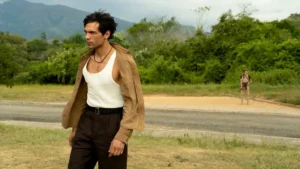Summary
The only thing harder than holding onto the American dream is the pursuit of it. That’s why Minari may be the most American film in years.
Let’s get one thing straight — Lee Isaac Chung’s Minari is an American movie. Yes, most of it is spoken in Korean. So what? This country doesn’t have a national language and is a multilingual country (non-English speakers are also protected by Title VI of the Civil Rights Act of 1964, by the way). It is a country built on the backs of immigrants who know the only thing harder than holding onto the American dream is the pursuit of it. That’s why Minari may be the most American film in years.
Chung’s semiautobiographical tale (he grew up in the rural farming community of Lincoln, Arkansas) is about a Korean family, the Yi’s. They have just relocated to a rural area of Arkansas. Jacob Yi (Steven Yeun) has the dream of turning his newly acquired purchase into rich farmland to offer uniquely Asian foods to an area that would be fresher from his farm than the produce coming from California. His wife, Monica (Yeri Han), went along with the move, but is unhappy about it living in a single wide home that’s elevated off the ground by cinder blocks and no stairs.
They both have taken jobs at a chicken farm to make ends meet while Jacob gets his business going. They have two children. Their oldest, Anna (Noel Kate Cho), is a precocious girl who is acting more mature than her age. She helps look over her little brother, David (Alan Kim), an adorable little boy whose curiosity is reaching its peak. They are living a quiet existence when Monica’s mother, Soon-ja (Youn Yuh-jung), comes to live with them. She is a real dame, foul-mouthed, clever, and makes a mean Kimchi and even some Korean stews.
Chung wrote the script for Minari and it’s one of the most stoic works about the immigrant experience (or in this case, second-generation) you’ll ever see. It has a gentleness that lays the simple story out but is not afraid to show the messiness of the family dynamics at play here. Monica vents her frustration to her mother about her husband, but Soon-ja, in anti-film cliche, supports Jacob. To offer comedic levity, little David is at odds with his Grandmother. Then, to top it off, you have the assimilation of the Yi family into the Arkansas community, including a terrific supporting turn by Will Patton as Christian who volunteers to help Jacob tend to his crops.
The film is a small family drama that is greatly detailed. It’s a patient film that is rewarding for the viewer. While the overall setting has a laidback feel, the family urgency is always at its peak. That is largely credited to two outstanding performances by Yeun and Han. Their conflict is real, but so are their hopes and moments of despair. Even the highs and moments of accomplishment are met with a surrounding thud when they come at all. Life isn’t easy, you do your best, raise your kids, and hope for the best. They are heartbreakingly real together.
There are even more people to talk about here. The film has some stunning cinematography by Lachlin Milne (Stranger Things) and will give Nomadland‘s Joshua James Richards (The Rider) a run for his money this year at awards time. I just loved Will Patton as Paul. He gives such a meaningful, delicate performance. He really hasn’t gotten the credit he deserves as a deeply spiritual, lonely, and ostracized man looking for friendship. Then you have Yuh-jung’s Soon-ja, the film’s breakout character and one of the best in years. She balances a fine line of humor and she fills the void by moving in with her daughter, which is a reminder Korean culture is not an autonomous one. Something the little ones are not understanding as they try to assimilate into an Americanized setting.
Chung’s film looks simple enough, but in other hands would have had a dangerous conflict with Patton’s character or an affair that rips the family apart. What he did was take an honest slice of the Asian migration experience that’s stripped of theatrics then filled with love, pride, and above all, hope.



